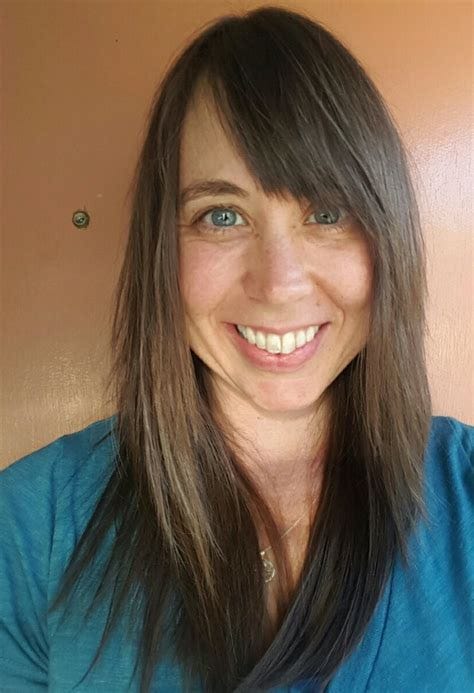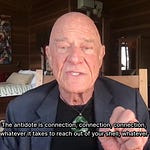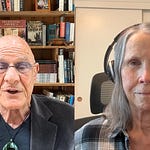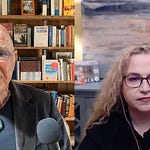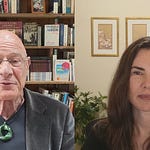Dear Listener,
This week I bring you my interview with Jessica Fern, a Psychotherapist, Coach, and Certified Clinical Trauma Professional. Jessica's work focuses on helping individuals, couples, and people in multiple-partner relationships break free from reactive patterns, cultural conditioning, insecure attachment styles, and past traumas to embrace new possibilities in life and love.
In our conversation, Jessica shared her personal journey of discovering her bisexuality as a teenager in New York City and coming out while in college. She discussed the complexities of non-monogamous relationships and the misconceptions surrounding them. Jessica emphasized that consensual non-monogamy is not solely about sex, but rather about building multiple emotional connections and exploring personal growth opportunities.
We talked about the challenges of managing time and relationships in non-monogamous dynamics. Jessica highlighted the importance of open communication, careful planning, and finding a balance that meets everyone's needs. She also discussed different forms of non-monogamy, such as polyamory and communal living, and how they offer unique opportunities for connection and personal development.
Throughout the interview, Jessica's expertise and passion for helping individuals navigate non-monogamous relationships shone through. Her books, including Polysecure: Attachment, Trauma, and NonMonogamy, The Polysecure Workbook: Healing Your Attachment and Creating Security in Loving Relationships, and Polywise: A Deeper Dive Into Navigating Open Relationships, provide valuable insights and guidance for those interested in exploring alternative forms of intimate connections.
To learn more about Jessica Fern and her work, visit JessicaFern.com. You can also connect with her on Instagram at @jessicafern411.
Golden Light,
Dr. Richard Louis Miller
Links & Resources:
The Polysecure Workbook: Healing Your Attachment and Creating Security in Loving Relationships
Compersion - positive feelings when a romantic partner engages in a relationship with another person
Polyagony - the painful experience that comes up for romantic partners when opening up a relationship
John Gottman - psychologist and marriage counselor
Listen to Learn
How did Jessica Fern's personal journey of discovering her bisexuality influence her work as a psychotherapist?
What are the misconceptions surrounding non-monogamous relationships?
How can non-monogamous relationships provide opportunities for personal growth and emotional connection?
What are the challenges of managing time in non-monogamous dynamics, and how do individuals navigate them?
What forms of non-monogamy exist, and how do they differ from cheating?
How does communal living facilitate non-monogamous relationships, and what benefits does it offer?
How does consensual non-monogamy challenge the traditional understanding of monogamy and relationships?
Seeking Psychedelic Testimonials: The Good, the Bad, and the Ugly.
We are currently looking for first-hand accounts of adverse effects of psychedelics—from ‘bad trips,’ to unwanted physiological complications, to abusive practices by guides, therapists, and shamans.
The interviews from this series will go into a forthcoming book on the topic—perhaps the first book its kind.
Please contact me if you would like to be interviewed. You can also leave us a voice message to share your story. We will keep your information anonymous unless you tell us otherwise.
My Books
Freeing Sexuality: Psychologists, Consent Teachers, Polyamory Experts, and Sex Workers Speak Out
Psychedelic Wisdom: The Astonishing Rewards of Mind-Altering Substances
Psychedelic Medicine: The Healing Powers of LSD, MDMA, Psilocybin, and Ayahuasca
Integral Psychedelic Therapy (co-edited with Jason A. Butler & Genesee Herzberg)
NOTE: The podcast is always freely available thanks to our paid subscribers. Please share this post to show your support for transparency. The following transcript distills the key points from this show into a condensed form. It is meant as a reference - listen to the full episode for an accurate rendition of the conversation.
Transcript
00:00 - Introduction
Richard Louis Miller (00:00): Welcome to MindBody Health and Politics. I'm your host, Dr. Richard Louis Miller. The mission of MindBody Health and Politics is to enhance your physical and emotional well-being and encourage community. I emphasize community because I believe that we humans are tribal animals and do better, are healthier, and happier when we live in relatively small tribes. Tribes could be ten, a hundred, perhaps even as many as a thousand. But when we know everyone by name, or at least by face, we get along very well. Crime levels are very low. Cooperation and collaboration are very high. Human beings love doing things together, whether it's a sewing circle, a poker game, watching a football game, or going for a bike ride. All kinds of inventing things together, creating things together. We are really cooperative, collaborative animals. We love eating together, getting together in circles, and sharing food. That's who we are.
However, we must also be cognizant of the fact that a very small percentage of us, much less than 5%, are not the same. They are very different. They are predators. They would have us be their subjects rather than have us be citizens. And throughout all of history, we have had to deal with these predator types who have gotten people to follow them and have then directed mostly young people to go out and kill others. This has been true through all of recorded history, going back to the Egyptians, fast forward to the Greeks, to the Romans, who also experimented with democracy and republic, when Caesar crossed the Rubicon, ended the Roman Republic, and formed an empire with a dictator.
Fast forward anywhere you want in history. Napoleon, Hitler, Mussolini, the wannabe dictator Trump. These are all people who would have a different way of life. And those of us who are in the great majority, the over 95 percent who are cooperative and collaborative, we must stay awake and aware and vote and ensure that we maintain our democracy and our republic. Even in hard times such as these. When my heart goes out to 60 percent of the American public who are living paycheck to paycheck, being concerned for food on the table and paying rent, even those of us suffering in that regard must stay awake, as citizens and must vote and ensure that we maintain our democracy and our republic. In the words of one of my great heroes, Thomas Jefferson, "Eternal vigilance is the price of liberty."
Today, on MindBody Health and Politics, we have the privilege of having with us Jessica Fern, who is a pioneer in experimenting with alternative forms of human relationships, alternative to what has been considered the traditional heterosexual monogamous way of relating. I say considered traditional because it isn't traditional throughout all of history. One on one monogamy, heterosexual monogamy, has not always been the traditional form. That's somewhat recent. And she has looked at this, she has experimented with this in her own life, and she's written some wonderful books about this. And we're going to learn today from Jessica Fern. Welcome to MindBody Health and Politics, Jessica.
04:51 - Jessica's Journey
Realizing her bisexuality as a teen in NYC
Coming out while in college
Being married and monogamous before exploring non-monogamy
Jessica (00:04:51): Oh, thank you, Richard.
Richard Louis Miller (00:04:54): Jessica, in reading your books, I realized that we're both project kids from New York.
Jessica (00:05:01): Are you kidding? Where did you grow up?
Richard Louis Miller (00:05:04): Ha, ha, well, I started out growing up partly in the swamps of Florida because my father was stationed at an Air Force base down there. It was a secret Air Force proving ground for jet propulsion, and I had the good fortune to go along with him. But then afterwards, we came back to New York City, and I lived in Stuyvesant Town, which was a Metropolitan Life Insurance project.
Jessica (00:05:29): Oh, yeah.
Richard Louis Miller (00:05:30): And you lived in one in Brooklyn, in Sheepshed Bay. So, New York project kids.
Jessica (00:05:50): New York Project Kids. Yeah.
Richard Louis Miller (00:05:52): And we both made it to California. Though, are you living in California these days? I see you're in North Carolina.
Jessica (00:05:59): North Carolina. Yeah, but a lot of my heart is in California.
Richard Louis Miller (00:06:04): What drew you to North Carolina, Jessica?
Jessica (00:06:07): We're outside of Asheville now. We had been moving around a bit, and for family reasons, we wanted to be back on the East Coast. There's a specific school here that really fits well for my son. So, there were a few different things that led us here.
Richard Louis Miller (00:06:28): And what size city or town do you live in?
Jessica (00:06:33): Asheville is pretty smallish, I'm going to say maybe 80,000, but I need to look that up.
Richard Louis Miller (00:06:40): Oh, are you near Ashland or in Ashland?
Jessica (00:06:43): Asheville, North Carolina. Yeah, we're just outside.
Richard Louis Miller (00:06:56): I live in a very small town of about 7,500 in Mendocino County.
Jessica (00:07:00): I think that's ideal.
Richard Louis Miller (00:07:00): This program is an opportunity for the people that I curate to express what's most important to them about what they're working on, either in their lives, or in their science, or in their writings. And this whole arena of alternative forms to heterosexual monogamy is your arena.
Jessica (00:07:31): It has been.
Richard Louis Miller (00:07:31): So let's take it from the top. How did you start entering what drew you into this arena originally? And then tell us what the landscape looks like. What are these words that we hear, such as polyamory, such as consensual non-monogamy? But first, tell us what drew you in, then the development of what it is, what it stands for. Take it from the top.
08:07 - Defining Non-Monogamy
Explanation of consensual non-monogamy vs. cheating
Misconceptions about reasons people are non-monogamous
Jessica (00:08:07): Great. I think part of what drew me in was just being an adolescent in New York and realizing around 14 years old that I wasn't straight, but bisexual. The experiences that followed led me to question monogamy, especially as a bisexual, wondering if that meant committing to one gender or sex for the rest of my life. I was thinking about and deconstructing this on my own, but it wasn't until later that I explored it more deeply.
Richard Louis Miller (00:08:53): You discovered this as a teenager.
Jessica (00:08:55): Yes, I did.
Richard Louis Miller (00:08:57): What was it like as a teenager in New York realizing you're attracted to both men and women? That's a lot for a teenager to handle.
Jessica (00:09:10): In some ways, it was fine. I had a group of friends who were similar, and we accepted and supported each other, exploring our identities behind the scenes. However, it wasn't until I went to college, fell in love, and dated a woman that I publicly came out as not straight. I attended an alternative college in Westchester with a big queer community, so it was a safe place to be. My family was supportive, but even with a progressive environment, I still had to explore the internalized homophobia within me.
Richard Louis Miller (00:10:58): Can you describe what it was like dealing with internalized homophobia?
Jessica (00:11:23): It mainly manifested in discomfort with public displays of affection with a woman, something I wouldn't feel with a man. This fear of judgment was how I first recognized the internalized homophobia.
Richard Louis Miller (00:11:42): And how did your attraction to women affect your relationships with men?
Jessica (00:11:42): The men I dated knew about my bisexuality. During the 90s and 2000s, there was an element of eroticization and objectification of bisexual women, but I didn't face negative pushback from the men I dated.
Richard Louis Miller (00:12:13): What happened next in your journey?
Jessica (00:12:13): Fast forward, I was in a monogamous marriage with a man and working as a therapist. In one week, all the couples I saw were exploring non-monogamy. I had personal experience but lacked professional expertise. This coincidence in Boulder, Colorado, led me to research and develop the body of work in my books, helping people navigate non-monogamy.
13:42 - Forms of Non-Monogamy
Lack of resources to guide non-monogamous clients
Different types under the consensual non-monogamy umbrella
Issues with the terminology used
Richard Louis Miller (00:13:42): And tell us some about what non-monogamous means.
Jessica (00:13:50): Consensual non-monogamy or ethical non-monogamy is an umbrella term for people who are in love, romantic, or sexual relationships with more than one person, with everyone knowing and agreeing to this structure. In contrast, non-monogamy that involves cheating means someone has more than one lover or emotional connection without everyone being aware.
Richard Louis Miller (00:14:36): Which has been the standard in this country, the cheating.
Jessica (00:14:48): Exactly, people often practice non-monogamy through cheating, having emotional or sexual affairs, despite ostensibly espousing monogamy.
Richard Louis Miller (00:14:59): Do you have any data on how many people are cheating in this country?
Jessica (00:15:00): The data varies, but some studies show as many as 50% of men and 20 to 40% of women have admitted to cheating in what was considered a monogamous relationship.
Richard Louis Miller (00:15:35): Does the research differentiate between one-time cheating and ongoing relationships?
Jessica (00:15:52): I'm not sure of the specific numbers, but studies have looked at the types of cheating that occur.
Richard Louis Miller (00:16:32): Heath Schlesinger from the Modern Family Institute mentioned that 5% of the U.S. population identifies as non-monogamous.
Jessica (00:16:46): Yes, and studies indicate that among millennials, up to 30% identify as non-monogamous.
Richard Louis Miller (00:17:04): There's a need to differentiate between those having relationships outside their primary relationship that include sex, and those that do not.
Jessica (00:18:05): That's right. Many people uneducated about this topic assume it's primarily about sex.
Richard Louis Miller (00:18:12): They think it's just an excuse to have sex with multiple people, creating a construct to justify it.
18:20 - Sexual vs Non-Sexual Relationships
Myth that non-monogamy is just about sex
Having emotional connections without sex
Jessica (00:18:20): Heath's research shows that the top reasons for being non-monogamous aren't about sex. People often cite benefits like more support and love, engaging in non-sexual activities with others, and personal growth opportunities from multiple relationships. The stereotype of non-monogamy being solely about sex isn't accurate for many people. And even if it is about wanting multiple sexual partners, we shouldn't pathologize that desire.
Richard Louis Miller (00:19:10): That's an important perspective. Let's delve into the complexities of having sex with more than one person.
Jessica (00:19:43): The complexities include managing STIs, which requires more conversations, testing, and considerations when sharing fluids with multiple people. Physical safety and health are significant concerns.
Richard Louis Miller (00:20:09): What about managing time?
Jessica (00:20:21): Time management is a challenge. Balancing the time available in our schedules for multiple partners is a reality that needs careful consideration.
Richard Louis Miller (00:20:43): This seems overwhelming, particularly for people with typical work schedules. How do people manage this?
Jessica: Managing time in non-monogamous relationships requires careful planning and prioritization. It's about balancing work, personal time, and time with each partner. The complexity increases with more partners, and it can be particularly challenging for those with demanding jobs or family commitments. Finding stability and arranging schedules in a way that meets everyone's needs is a key part of successful non-monogamous relationships.
21:25 - The Challenges of Time Management
Difficulty of juggling multiple partners and relationships
Some manage well with calendars, others struggle
Communal living can make non-monogamy easier
Jessica (00:21:25): Yes, managing time for oneself is also crucial.
Richard Louis Miller (00:21:55): It seems daunting to manage multiple relationships. How does this work out in practice, both personally and with your patients?
Jessica (00:22:42): Some people manage it very well with calendars and scheduled nights with different partners. Childcare is also organized. It's a well-oiled system, but it can be challenging if something falls off. People living in communal settings find it easier to manage.
Richard Louis Miller (00:22:46): Tell us about communal living experiments.
Jessica (00:23:17): Communal living can involve multiple people in one house or different homes where people regularly come together. There are also communities like Tamara in Portugal, exploring living in community and addressing how we relate to sexuality, romance, and love.
Richard Louis Miller (00:24:00): How do people manage time and relationships in these settings?
Jessica (00:24:43): While some manage their time well, others find it difficult, leading to relationships that don't feel fulfilling due to lack of time and consistency. Some prefer non-attachment based relationships, seeing partners occasionally, which works for them.
Richard Louis Miller (00:24:53): Are these meetings always sexual?
Jessica (00:24:57): They can be either sexual or non-sexual.
Richard Louis Miller (00:25:01): How is this different from friendship?
Jessica (00:25:43): The term 'polyintimates' describes relationships that are more than friendship but not necessarily sexual. These can involve a sense of partnership, shared decision-making, and even co-parenting, offering more depth than the term 'friends' implies.
Richard Louis Miller (00:25:47): Are you comfortable discussing your personal situation?
Jessica (00:25:49): Yes, I'm open to discussing my situation with David. And regarding the section about David in my book, you can invite him for an interview as well.
26:14 - Jessica's Personal Situation
Being with her former husband David for 21 years
Trying polyamory within their marriage
Eventually divorcing but reuniting as co-parents
Jessica (00:26:14): I'm sure David would love to join for an interview.
Richard Louis Miller (00:26:25): Maybe we'll arrange another interview with him or both of you together.
Jessica (00:26:35): David and I have been together for 21 years. We met in 2002 in Northern California at a massage school. Initially, we were close friends, then got together, got married, had a son, and were polyamorous. The idea of polyamory was something we discussed before marriage due to my bisexuality. The week my clients came to me with their non-monogamy issues reawakened my interest in it. David and I spent weeks discussing what polyamory would mean for us, eventually deciding to pursue it.
Richard Louis Miller (00:28:07): Until then, you were a monogamous couple?
Jessica (00:28:21): Yes, but we were non-traditional. We had deep emotional intimacies with friends of opposite genders, including trips and overnights, which might have been too close for others in more traditional relationships. We then opened up to romantic sexual relationships with others. However, we got divorced, lived apart for about a year and a half, and have now come back together.
Richard Louis Miller (00:29:54): Did polyamory contribute to your divorce?
Jessica (00:30:28): Polyamory exposed dynamics in our relationship that we didn't address in monogamy. We had a codependent dynamic where I would over-function and he would under-function. Polyamory made us realize we couldn't continue these behaviors and have space for others. Our pacing in addressing these issues differed, leading to a separation to reestablish ourselves in a more interdependent way.
Richard Louis Miller (00:31:47): You got divorced and then moved back in together?
Jessica (00:31:55): Yes, we were divorced for about a year and a half, then moved back in together. We're not in a sexual and romantic relationship now, but consider each other life partners, co-parents, and creative partners. We run a home together and have written a book together.
Richard Louis Miller (00:32:26): Is your relationship with David a primary relationship?
Jessica (00:32:33): To a degree, yes. It's a primary relationship, and we each have other relationships as well.
32:37 - Jessica's Current Relationships
Re-committing as life partners with David
Each having another long-term partner
Jessica (00:32:37): After our divorce, David and I had a ceremony to release our wedding vows and then recommitted to each other as parents and life partners, agreeing to support each other in life, growth, and hard times. We essentially committed to having each other's back in this life.
Richard Louis Miller (00:33:24): What about the legal implications of your divorce, like social security, tax benefits, and life insurance?
Jessica (00:33:31): Technically, we might be losing out on some legal benefits of being married, but we each have other partners, and we prefer not having the enmeshment that legal marriage created.
Richard Louis Miller (00:33:58): Is your son living with both of you?
Jessica (00:34:01): Yes, he's nine and living with us.
Richard Louis Miller (00:34:14): You mentioned having other partners. Could you elaborate on that?
Jessica (00:34:31): Currently, David and I each have one other partner. Both of our partners have children and their own households. My partner spends a few nights a week at our place or we spend nights at his, along with his kids.
Richard Louis Miller (00:35:22): What is the impact of this lifestyle on your son?
Jessica (00:35:34): We introduced our partners to our son gradually. He adores them and enjoys spending time with them and their kids. These relationships provide him with additional positive role models and attention. Our polyamory feels like an addition to his life rather than a loss, as David and I remain his primary attachment figures.
36:47 - Managing Multiple Relationships
Coordinating parenting schedules with partners
Jessica's relationships adding support for her son
Richard Louis Miller (00:36:47): Do you see your relationship with this other man as long-term or temporary?
Jessica (00:37:00): We see it as a long-term relationship, with the hope and intention of possibly cohabitating in the future.
Richard Louis Miller (00:37:16): In addition to your relationships with Dave and this other man, you mentioned the possibility of dating more people in your book.
Jessica (00:37:32): Currently, I'm at my saturation point and don't have the time for additional relationships. But yes, some people do manage to have multiple partners, with or without hierarchical structures.
Richard Louis Miller (00:38:19): Dave mentioned in the book his feelings when you first started having sexual relationships with others. This must be a common issue for couples who open up their relationship. Can you discuss strategies or advice for managing these situations?
Jessica (00:39:04): It's important to have tactics and procedures for managing the emotions and dynamics that arise in open relationships. I recommend going into the HEART program, which is designed to help couples navigate these complexities.
39:06 - Coping With Jealousy
Common feelings of jealousy and attachment panic
Need for self-healing and improved communication
Jessica's HEART framework for secure relating
Richard Louis Miller (00:39:06): How do you deal with jealousy in these relationships?
Jessica (00:39:13): Many people struggle with jealousy, experiencing intense emotions when their partner is with someone else. Dealing with jealousy involves a multi-pronged approach, including self-regulation, exploring trauma history, and addressing attachment needs to avoid overwhelming feelings of panic or abandonment.
Richard Louis Miller (00:40:30): It seems like having a guide is essential for couples exploring non-monogamy.
Jessica (00:40:46): Yes, having a guide is beneficial. My work involves helping people navigate these relationships. Professional guidance, community support, and resources like podcasts can be crucial in adapting to this lifestyle.
Richard Louis Miller (00:41:34): What was it like in the past when there was less openness about non-monogamous relationships?
Jessica (00:43:53): Non-monogamy has always existed, but it was often hidden or not openly discussed. The sexual revolution, internet, and movements like gay rights and gender diversity have paved the way for more open discussions and acceptance of non-monogamy. There's still progress to be made, but these movements have significantly contributed to societal deconstruction of traditional monogamous norms.
45:21 - Historical Context
Non-monogamy likely happened secretly before
Social change enabling more openness about it
Richard Louis Miller (00:45:21): In your situation, your other partner is not married but single, living alone with his child. Dave's partner might be single too. In these dynamics, there's often a socio-political imbalance where the person not living with the primary partner can be seen as "one down" in the relationship.
Jessica (00:46:28): Dave considers his other partner as his primary in terms of romantic and sexual energy, despite not living together. Our relationships don't strictly adhere to the primary-secondary model, but there are certain areas, like living together, where it can appear that way.
Richard Louis Miller (00:47:53): There's a need for new language to describe these relationships fairly, without implying a hierarchy.
Jessica (00:48:30): We acknowledge the complexity and the need for new language. Our relationships are lived differently than the typical primary-secondary model. There's also a need for legal recognition of multiple partners in terms of sharing resources like insurance or inheritance.
Richard Louis Miller (00:49:15): This extends to legal rights and recognition, like in the case of David Jay, who legally became a second father in a polyamorous family.
Jessica (00:50:30): People are finding creative solutions, like forming trusts for shared ownership or inheritance among multiple partners. This is a great example of adapting to these relationship structures.
Richard Louis Miller (00:50:55): There are positives to this experimentation, but also significant challenges. You mention an acronym, H.E.A.R.T., in your work.
51:19 - The HEART Framework
Summary of the skills for secure attachment
Presence, expressing delight, emotional attunement
Shared rituals and repairing conflict
Jessica (00:51:19): The HEARTS acronym is a guide for enhancing attachment in relationships. H stands for 'Here', focusing on being present with your partner. E is 'Express Delight', showing your partner that you adore and admire them through actions and words. A is 'Attunement', tuning into your partner's emotional experience and showing genuine interest in their feelings and needs. R is 'Rituals and Routines', creating shared daily practices or special ceremonies that enhance the bond. T is 'Turning Towards After Conflict', managing conflicts by facing them together and working on solutions.
Richard Louis Miller (00:53:26): These principles seem simple but are not always easy to implement consistently.
Jessica (00:56:21): It's important for couples to determine the amount of time they need to spend together each week, ideally meeting at least once a week to connect deeply without distractions.
Richard Louis Miller (00:57:41): The importance of dedicating weekly time for couples to be present with each other is crucial.
Jessica (00:57:52): Turning towards each other after conflict, as suggested by John Gottman, is vital. It's not about the intensity or frequency of arguments, but about how quickly and effectively you can repair and find solutions.
58:44 - Conclusion
Brief final thoughts
Overview of discussion
Jessica (00:58:44): The last element of the HEARTS acronym is S, for 'Secure Attachment with Self'. It's about nurturing our own well-being, being present with ourselves, valuing and attuning to our own needs and feelings, maintaining personal rituals and routines for wellness, and addressing our inner conflicts. This self-attachment is crucial for being in a secure relationship with others.
Richard Louis Miller (00:59:35): We've just begun exploring these concepts, and I hope you'll return for another interview, possibly with David as well. Thank you, Jessica Fern, for sharing your insights and your book. Our listeners will benefit from exploring your work further. Thank you for joining us on MindBodyHealth and Politics.


